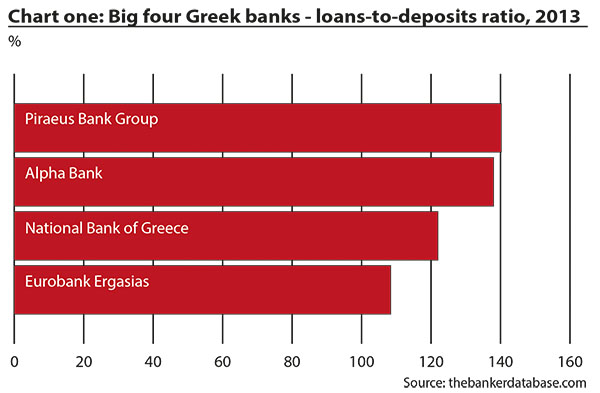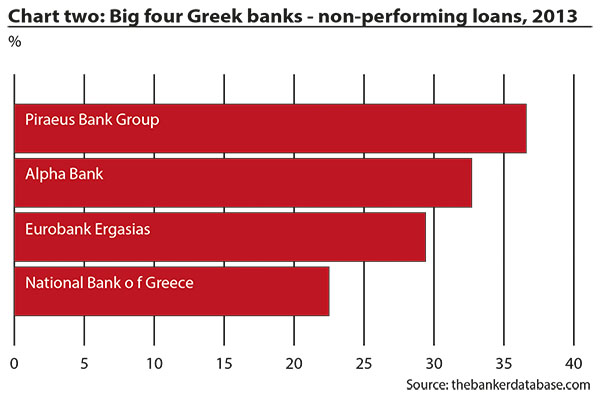The stand-off between Greece and the rest of the eurozone over the terms of the country’s bail-out raises uncertainty over local banks’ funding ability. With a troubling combination of low deposits and likely shortfalls in European Central Bank funding,The Banker looks at how they might cope.
The deposit flight from Greek banks began two months before the Greek presidential election, which took place on January 25. According to the Bank of Greece, €4.6bn was withdrawn by domestic depositors in December 2014 and, according to Thomson Reuters, an estimated €11bn to €12bn left the banking system in January. This marks the single largest two-month wave of withdrawals since May 2012, when the then-newly elected government’s inability to form a coalition created similar unease among depositors.
Depending on how negotiations between Greece and the rest of the eurozone proceed, banks might also find themselves without access to European Central Bank borrowing. Admittedly, throughout the past year, Greek banks have decreased their reliance on the Greek central bank to help with liquidity, but as the deposit withdrawals picked up in December, loans by the Bank of Greece to local banks soared by €11.2bn to €56bn, the first such increase since June 2012.
Fragile recovery
Estimates suggest that domestic deposits in Greece may have decreased to Ä161.2bn in February, which is below the average level of deposits for 2012, opening the possibility that Greek lenders might see their loan-to-deposit (LTD) ratios strained yet again.
This tightening comes as Greek banks were starting to rebuild their balance sheets after the battering they took in 2012. The four biggest lenders – National Bank of Greece, Alpha Bank, Eurobank Ergasias and Piraeus – which held 98.3% of total banking assets at the end of 2013, were in the process of steadily closing the funding gap as they attracted nearly €58.1bn in new deposits over the course of the year, which reduced their average LTD ratio by 21.32 percentage points to 126.52%. The estimated drop in deposits more recently would outpace deleveraging among lenders, potentially creating a rebound in average LTD ratio to more than 131% for the group.
For Alpha Bank and Piraeus, which expanded their loan books in 2013, this could be challenging. The two banks hold more non-performing loans (NPLs) than their peers and are at the same time more reliant on wholesale funding.
Piraeus increased its total loans to €76.1bn in 2013, partially as a result of it taking over Portuguese-owned Millennium Bank’s Greek operations, which contributed €4.8bn in loans and which, with an LTD ratio of 159.84% was poorly funded. The bank’s LTD ratio increased almost four percentage points to 140.23% as a result of the acquisition and its NPLs increased disproportionately to 36.6% making it more vulnerable to sudden deposit drops. However, bucking the prevailing trend in Greece, the group earned positive profits in 2013, and enjoyed a healthy return on capital of 21.29%, providing it with a cushion.
Alpha bank, which acquired the ailing Emporiki in 2013, finds itself in a similar situation. Its total loans grew to €58.6bn, largely due to the Emporiki acquisition as the bank had €22.6bn in its loan portfolio. However, Alpha’s LTD ratio actually dropped 20 percentage points to 138.01%, despite the fact that with a stand alone LTD of 178.50% Emporiki was poorly funded. This is still the second highest LTD ratio in all of Greece, along with second highest ratio of NPLs, which however could be offset by the bank’s high profitability – at €2.3bn, it earned the highest returns in the country.
Although National Bank of Greece and Eurobank hold less Tier 1 capital than their peers, they are stronger both in terms of asset quality and funding. National Bank of Greece is the leading lender on the Greek market and it manages to outshine the others in terms of NPLs – only 22.5% of its loans are in three-month default. Eurobank, on the other hand, has a smaller loan portfolio than any of its peers and is better funded, with an LTD ratio of 108.39%.




